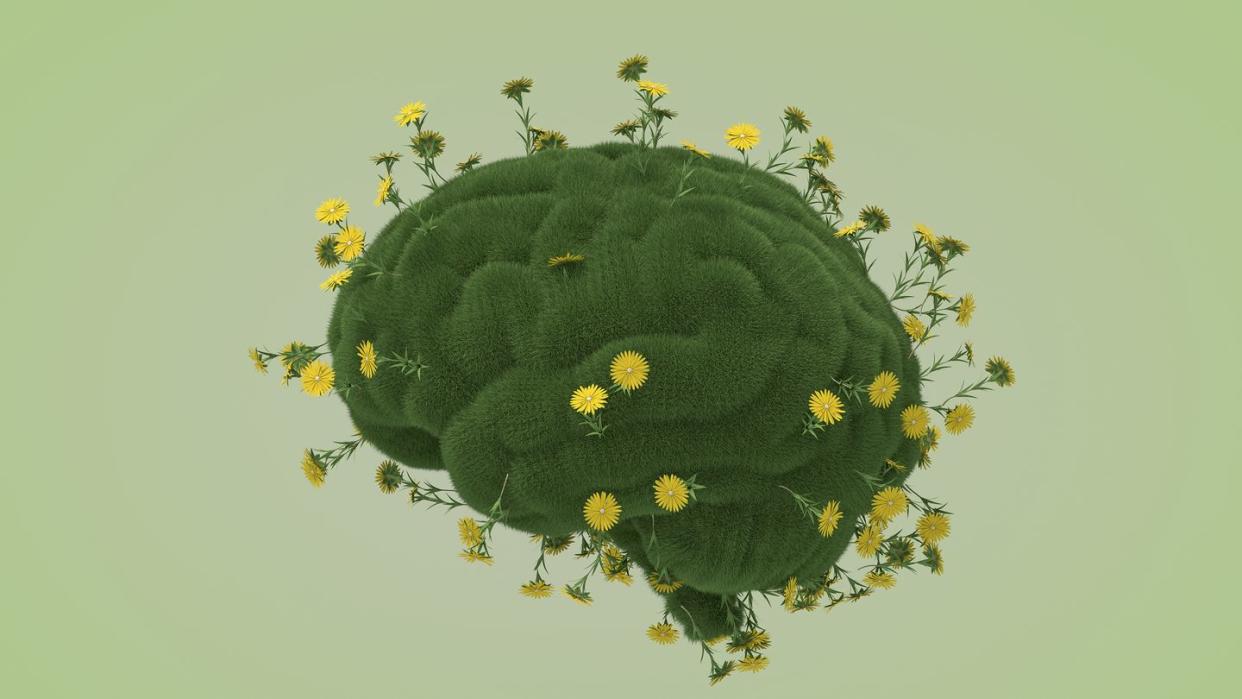5 Things You Should Be Doing Now to Prevent Dementia

"Hearst Magazines and Yahoo may earn commission or revenue on some items through these links."

Sure, you know that learning a new language or doing daily crossword puzzles can help stave off cognitive decline, but let’s face it—who has time? The good news is that there’s a lot you can do to control the speed and rate of memory decline without ever having to play Wordle. In fact, a 2020 report in the medical journal The Lancet found that 12 controllable risk factors—including lack of exercise, smoking, and underlying conditions like high blood pressure or diabetes—are the cause of up to 40 percent of all dementia cases. “There’s a lot within your control that’s easy to do,” stresses Gary Small, MD, chair of psychiatry at Hackensack University Medical Center and author of The Memory Bible.
Here are six healthy strategies to adopt now that will help reduce your risk of dementia later in life.
Exercise to prevent brain shrinkage
“The number one thing you can do to delay the onset of dementia is to get enough physical exercise,” says Small. “It gets your heart to pump oxygen and nutrients to your brain cells and provides brain-derived neurotrophic factor, which acts like fertilizer to your brain neurons.” It’s especially important once you hit your mid-30s and 40s, he adds, which is when your hippocampus—the memory center of your brain—begins to shrink. Research suggests that exercise sessions of 45 to 60 minutes most days of the week offer the biggest brain benefits. Include high-intensity resistance exercise a couple days a week, too: A study published in 2020 in the journal NeuroImage found that six months of high-intensity resistance training also helps to prevent shrinkage of the hippocampus. Short on time? Do an intense, quick burst of exercise. A 2023 study published in The Journal of Physiology found that six minutes of high-intensity exercise, like a bout of cycling, increases production of a specialized protein that boosts learning and memory and could protect your brain from age-related cognitive decline.
It’s also important to move around often, advises Small. Adults between age 45 and 75 who sat at least three hours a day had substantial thinning of their medial temporal lobe, a part of the brain responsible for the formation of new memories, compared to those who sat less often, in a study published in the journal PLOS One in 2018. “This thinning is usually a precursor to dementia,” he notes.
Eat more MIND-fully
A study published this past February in the journal Annals of Neurology found that a healthy diet slows the onset of dementia by slowing down your body’s pace of biological aging. People who most closely followed the MIND diet, a plant-heavy eating pattern, had a reduced risk of dementia. The MIND diet includes:
· At least 2 daily servings of veggies, including one that’s leafy greens
· 2 to 5 servings per week of berries
· At least three daily servings of whole grains
· At least five weekly servings of nuts and seeds
· 3 to 4 servings per week of beans
· At least one serving a week of fatty fish like salmon, mackerel, or sardines
· At least two weekly servings of poultry
· 2 tablespoons per day of extra-virgin olive oil
Put more simply, focus on a plant-based diet that minimizes red meat, whole-fat dairy, processed foods, and refined sugars, all of which “raise cholesterol and increase risk for type 2 diabetes, both of which increase your risk of dementia,” says Small.
Be fastidious about getting vaccines
It won’t just lessen the likelihood of your getting sick (or minimize the symptoms if you do); it appears to reduce the risk of your developing dementia. Getting vaccinated against diseases such as tetanus, diphtheria, shingles, and pneumococcus is associated with a reduced risk to develop Alzheimer’s disease, according to a 2023 study published in the Journal of Alzheimer’s Disease. Another, earlier study found that people who got at least one flu vaccine were 40 percent less likely to develop Alzheimer’s disease, compared to those who were unvaccinated. While it’s unclear exactly why, one theory is that many vaccines have an anti-inflammatory effect, which helps protect the brain, says Small.
Check your hearing—and your teeth
Put these two items on your to-do list: Get your hearing checked, and see your dentist regularly. Even very minor hearing losses can contribute to cognitive decline, according to a 2019 study published in JAMA Otolaryngology-Head and Neck Surgery. Additionally, the bacteria that cause gum disease have been linked to dementia, so keep up with dental appointments and floss daily. While you’re at it, if your doctor flags your blood pressure, cholesterol, or blood sugar levels during your annual checkup, take it seriously. “These sorts of diseases damage the small blood vessels in the brain, which can contribute to dementia,” stresses Carolyn Fredericks, MD, a neurologist at Yale School of Medicine and Yale New Haven Hospital in New Haven, Connecticut. That’s why you want to get them under control as soon as possible. A 2022 study published in JAMA Network Open found that having higher blood pressure even in young adulthood was linked to poorer brain health in middle age.
Ask about hormone replacement therapy
If you’ve started to experience menopause symptoms such as hot flashes and night sweats, talk to your doctor about whether hormone replacement therapy (HRT) is right for you. It may be protective against dementia if it’s taken in perimenopause or early postmenopause, per a 2023 meta-analysis of over 50 studies published in the journal Frontiers in Aging Neuroscience. “There might be a ‘window of opportunity’ for the effectiveness of HRT in terms of dementia-risk reduction if it’s started 10 years before the start of menopause, or perhaps even before the final menstrual period, during perimenopause,” explains review author Lisa Mosconi, MD, director of the Alzheimer’s Prevention Program and Women’s Brain Initiative at Weill Cornell Medicine in New York City. The theory is that during this time, your brain is more receptive to the positive effects of estrogen, which slows down cognitive decline.
Cut out certain meds
There are two types of drugs that appear to increase your risk of developing dementia, says Fredericks. These are benzodiazepines, which include anti-anxiety medicines such as alprazolam (Xanax) and diazepam (Valium), and anticholinergic medicines such as diphenhydramine (found in over the counter meds like Benadryl and Tylenol PM). Both have been associated with an increased risk to develop cognitive problems if they’re used for more than a few months. “I recommend women avoid these drugs even in middle age,” says Fredericks. The anticholinergic medications are especially problematic because they block acetylcholine, a brain chemical that’s involved in learning and memory.
You Might Also Like

